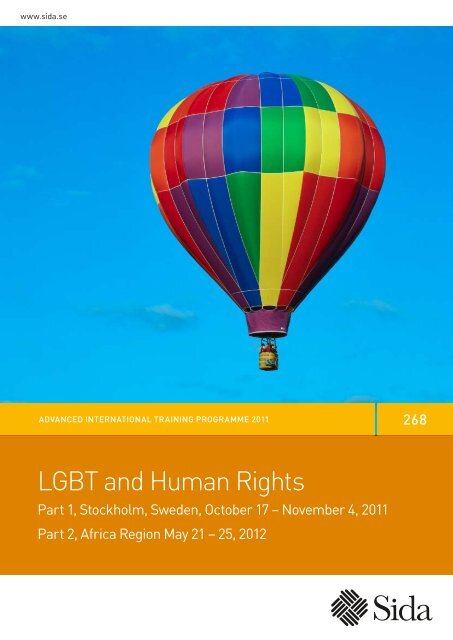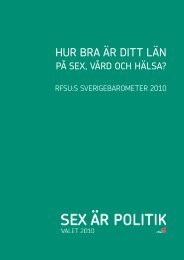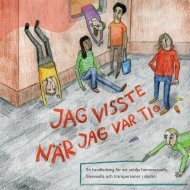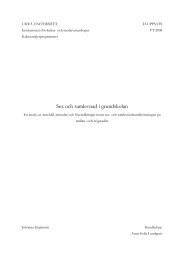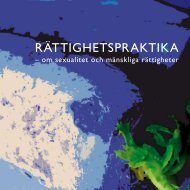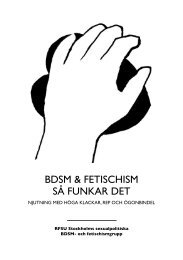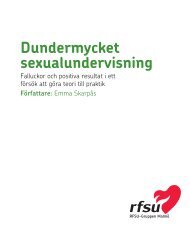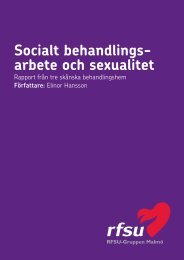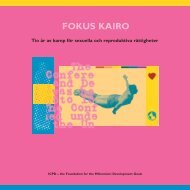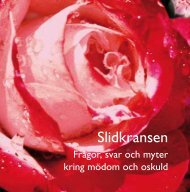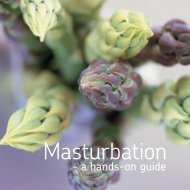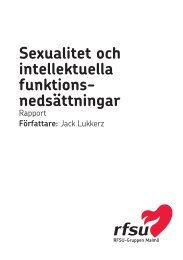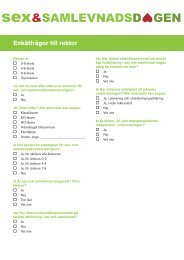LGBT and Human Rights - RFSU
LGBT and Human Rights - RFSU
LGBT and Human Rights - RFSU
Create successful ePaper yourself
Turn your PDF publications into a flip-book with our unique Google optimized e-Paper software.
www.sida.se<br />
Advanced International Training Programme 2011 268<br />
<strong>LGBT</strong> <strong>and</strong> <strong>Human</strong> <strong>Rights</strong><br />
Part 1, Stockholm, Sweden, October 17 – November 4, 2011<br />
Part 2, Africa Region May 21 – 25, 2012
Invitation<br />
The Swedish International Development Cooperation Agency<br />
(Sida) offers, as part of its bilateral development assistance,<br />
Advanced International Training Programmes of strategic importance<br />
to the social <strong>and</strong> economic development in the participants’<br />
countries. The International Training Programmes are specially<br />
designed for persons qualified to participate in reform processes<br />
of strategic importance on different levels <strong>and</strong> holding a position<br />
in home organisation with m<strong>and</strong>ate to run processes of change.<br />
This methodology is based on the assumption that your country<br />
wishes to carry out changes <strong>and</strong> is willing to invest own resources<br />
to achieve these changes. In the long-term perspective the programmes<br />
shall contribute to institutional strengthening <strong>and</strong><br />
capacity development in the participants’ countries.<br />
The training is focused on support to individual or team plans<br />
for change. The plan shall be well established in the participant’s<br />
organisation <strong>and</strong> is a basic part of the programme concept.<br />
In this brochure you will find information on the specific objectives<br />
for this particular programme, its content <strong>and</strong> structure, <strong>and</strong><br />
how <strong>and</strong> when to apply. You will also find an application form.<br />
Sida <strong>and</strong> the Swedish Government have recognised the need to<br />
strengthen <strong>LGBT</strong> persons’ human rights internationally. In Sweden’s<br />
international policy on sexual <strong>and</strong> reproductive health <strong>and</strong><br />
rights, it is stated that Sweden will work internationally for decriminalisation<br />
of sexual relations between persons of the same sex, as<br />
well as for the introduction of protection against discrimination on<br />
grounds of sexual orientation. The training programme we hereby<br />
invite to will hopefully be building capacities <strong>and</strong> create useful networks<br />
for key persons <strong>and</strong> organisations in order to work towards<br />
these goals.<br />
The Swedish Association for Sexuality Education (<strong>RFSU</strong>) has more<br />
than 70 years of experience in working with sexuality education as<br />
well as with sexual <strong>and</strong> reproductive health <strong>and</strong> rights in Sweden <strong>and</strong><br />
internationally. The Swedish Federation for Lesbian, Gay, Bisexual<br />
<strong>and</strong> Transgender <strong>Rights</strong>, (RFSL), has over 50 years of experience in<br />
working for <strong>LGBT</strong> health <strong>and</strong> rights through advocacy <strong>and</strong> support.<br />
With funding from Sida, <strong>RFSU</strong> <strong>and</strong> RFSL will together organise <strong>and</strong><br />
conduct the training programme on <strong>LGBT</strong> <strong>and</strong> <strong>Human</strong> <strong>Rights</strong>.<br />
Participants working in fields where they can have an influence on<br />
the respect for <strong>LGBT</strong> persons’ human rights through their positions<br />
within NGOs, political, juridical or religious systems, or in other<br />
relevant organisations, are invited to participate. We trust that the<br />
programme will contribute to the strengthening of individual <strong>and</strong><br />
organisational capacities <strong>and</strong> it is with a great pleasure we hereby<br />
invite you to apply.<br />
Lena Ingelstam<br />
Director<br />
Sida<br />
Åsa Regnér<br />
Secretary General<br />
<strong>RFSU</strong><br />
Ulrika Westerlund<br />
President<br />
RFSL<br />
Programme Purpose<br />
The programme purpose of the Lesbian,<br />
Gay, Bisexual <strong>and</strong> Transgender<br />
Persons (<strong>LGBT</strong>) <strong>and</strong> <strong>Human</strong> <strong>Rights</strong><br />
training programme is that participants<br />
after the programme should<br />
have useful tools <strong>and</strong> perspectives for<br />
working for <strong>LGBT</strong> persons’ human<br />
rights.<br />
Results<br />
The results of the training programme<br />
is that participants after the<br />
programme should<br />
– have knowledge in relevant areas<br />
concerning <strong>LGBT</strong> <strong>and</strong> <strong>Human</strong><br />
<strong>Rights</strong><br />
– be able to plan <strong>and</strong> implement<br />
projects successfully<br />
– be able to work successfully with<br />
advocacy<br />
– have access to sustainable networks<br />
supporting the work for<br />
<strong>LGBT</strong> persons’ human rights<br />
Contents<br />
Week 1: Sexualities, Norms <strong>and</strong><br />
Genders<br />
Week 2: <strong>Human</strong> <strong>Rights</strong> <strong>and</strong> Protection<br />
for <strong>LGBT</strong> Persons<br />
Week 3: Supporting <strong>LGBT</strong> in Practice<br />
Week 4: Regional follow-up<br />
Within these themes there will be<br />
lectures, group discussions <strong>and</strong> workshops<br />
on:<br />
– Perspectives on Sexualities, Gender<br />
Identities <strong>and</strong> Sexual Orientation<br />
– Sexual Health <strong>and</strong> Sexual <strong>Rights</strong><br />
– <strong>LGBT</strong> <strong>and</strong> the Right to Health<br />
– The World <strong>and</strong> Violation of<br />
<strong>LGBT</strong> <strong>Human</strong> <strong>Rights</strong><br />
– Religion <strong>and</strong> <strong>LGBT</strong> <strong>Human</strong> <strong>Rights</strong><br />
– <strong>Human</strong> <strong>Rights</strong> – International<br />
Law. Conventions <strong>and</strong> Treaties.<br />
– International <strong>and</strong> National Advocacy<br />
Work for <strong>LGBT</strong><br />
– Planning with LFA<br />
– Education as Method for Change<br />
– Parliamentarians’ <strong>and</strong> Politicians’<br />
Work for Change<br />
– Empowerment of <strong>LGBT</strong><br />
– Strategic Advocacy Work<br />
– Governmental Bodies <strong>and</strong> Work<br />
for <strong>LGBT</strong> <strong>Human</strong> <strong>Rights</strong><br />
– Region-Specific Challenges<br />
Programme Structure<br />
The programme is divided into two<br />
parts. The first part takes place during<br />
three weeks in Sweden in October/November<br />
2011 <strong>and</strong> focuses on<br />
theoretical <strong>and</strong> practical components<br />
within the field of <strong>LGBT</strong> <strong>and</strong><br />
<strong>Human</strong> <strong>Rights</strong>. After this, time is<br />
given to participants to work with<br />
their own projects in their respective<br />
countries. Mentors will be assigned<br />
for feedback on the progress. A follow-up<br />
week will take place in the<br />
participants’ region six months after<br />
the first three weeks in Sweden. An<br />
Internet site will be established for<br />
enabling easy networking <strong>and</strong> support<br />
between the participants.<br />
Participants that apply for the programme<br />
should have a project or a<br />
programme – “Project for Change”<br />
– that is applicable to <strong>LGBT</strong> <strong>and</strong><br />
<strong>Human</strong> <strong>Rights</strong>, or plan to have one,<br />
that is commencing or running during<br />
the first half-year of 2012. In<br />
the selection process, priority will be<br />
given to applicants with relevant<br />
Projects for Change. All applicants
should be advised that the programme<br />
does not entail funding for<br />
such projects of change. To describe<br />
your Projects for Change, please use<br />
the template available at<br />
www.rfsu.se/lgbthr-project<br />
Dates <strong>and</strong> places<br />
The first part of the programme will<br />
take place in Stockholm, Sweden,<br />
October 17th – November 4th, 2011.<br />
The second part will take place in<br />
Africa region, May 21st – 25th, 2012.<br />
Teaching<br />
Swedish <strong>and</strong> international experts with<br />
extensive experience from <strong>LGBT</strong> <strong>and</strong><br />
<strong>Human</strong> <strong>Rights</strong> issues <strong>and</strong> international<br />
Sexual <strong>and</strong> Reproductive Health <strong>and</strong><br />
<strong>Rights</strong> (SRHR) projects will give lectures<br />
<strong>and</strong> hold workshops. The course<br />
will deal with theoretical <strong>and</strong> practical<br />
components of <strong>LGBT</strong> <strong>and</strong> <strong>Human</strong><br />
<strong>Rights</strong> as well as general <strong>and</strong> personal<br />
capacity to underst<strong>and</strong> <strong>and</strong> perform<br />
tasks within the field. There will be a<br />
combination of lectures, participatory<br />
exercises, group work <strong>and</strong> field visits.<br />
The resource persons <strong>and</strong> facilitators<br />
are persons of expertise that are experienced<br />
in the fields of law <strong>and</strong> social<br />
sciences. Subject specialists on sexuality,<br />
sexual orientation, sexual health,<br />
gender, rights, advocacy <strong>and</strong> planning<br />
processes will be included.<br />
Management <strong>and</strong> staff<br />
The programme is planned <strong>and</strong> implemented<br />
by <strong>RFSU</strong> in institutional<br />
partnership with RFSL .<br />
The programme steering committee<br />
with members from both organisations<br />
as well as from Faculty of Law<br />
at Uppsala University is responsible<br />
for the programme content <strong>and</strong> the<br />
selection of participants in collaboration<br />
with Sida. The programme<br />
secretariat is managed by <strong>RFSU</strong>.<br />
Participation<br />
Target regions:<br />
Botswana, Cameroon, Ethiopia,<br />
Kenya, Malawi, Moçambique,<br />
Namibia, Nigeria, Rw<strong>and</strong>a, South<br />
Africa, Tanzania, Ug<strong>and</strong>a, Zambia,<br />
Zimbabwe.<br />
Target Group:<br />
The programme is designed for participants<br />
working in organisations or<br />
sectors giving them an influence on<br />
issues concerning <strong>LGBT</strong> <strong>and</strong> human<br />
rights. Applicants should have plans<br />
for, or ongoing, projects aiming at<br />
enhancing the human rights for<br />
<strong>LGBT</strong> persons in their respective<br />
country.<br />
The course is open only for application<br />
by participants from countries<br />
mentioned above.<br />
Requested qualifications are:<br />
– A minimum of three years working<br />
experience in either <strong>LGBT</strong> or<br />
<strong>Human</strong> <strong>Rights</strong>’ field or academic<br />
degree in social sciences, law, public<br />
health or related fields of study<br />
– Equivalent knowledge obtained<br />
through similar experiences<br />
The participants can be:<br />
– Decision makers <strong>and</strong> public opinion<br />
builders, eg. at ministerial or<br />
other political levels who have influence<br />
on SRHR or HR policies<br />
<strong>and</strong> programmes, legislative processes,<br />
human rights, <strong>and</strong> values in<br />
society related to sexuality, sexual<br />
orientation or gender identity.<br />
– NGO representatives working<br />
with <strong>LGBT</strong> or rights issues.<br />
Language requirements<br />
Excellent speaking <strong>and</strong> writing skills<br />
in English<br />
Application Process<br />
Closing date for application is<br />
April 8th, 2011.<br />
Applications submitted after closing<br />
date will not be considered. Applications<br />
should be written on the special<br />
form attached <strong>and</strong> include a recent<br />
photograph <strong>and</strong> required information<br />
<strong>and</strong> documents, including a description<br />
of the participant´s Project<br />
for Change. An English language test<br />
should be made with an official body<br />
in the home country of the applicant,<br />
unless the applicant can provide<br />
other documentation to support<br />
her/his ability.<br />
The Swedish Embassy/Consulate<br />
does not carry out language tests but<br />
may be able to recommend appropriate<br />
language institutes for conducting<br />
tests. When necessary, the<br />
application should be approved by<br />
the official nominating authority in<br />
the country. Applications should be<br />
submitted to the nearest Swedish<br />
Embassy. If there is no Swedish Embassy/Consulate<br />
in the applicant’s<br />
country, the application should be<br />
submitted directly to Programme<br />
Secretariat. Selected applicants will<br />
be notified by e-mail or fax. Once<br />
accepted, the applicant must confirm<br />
participation. An invitation letter will<br />
be sent out, containing additional<br />
information on the programme <strong>and</strong><br />
the practical arrangements.<br />
Family members are not allowed<br />
to accompany participants to the<br />
programme.<br />
Cost of Participation<br />
The cost of the programme is<br />
divided between a participation fee<br />
<strong>and</strong> accommodation cost. The participation<br />
fee covers all training cost<br />
such as lectures, literature, documentation,<br />
study tours <strong>and</strong> certain social<br />
activities, as well as accommodation<br />
costs include board <strong>and</strong> lodging. The<br />
Swedish International Development<br />
Cooperation Agency (Sida) will cover<br />
these costs. Sida will also cover international<br />
travel costs to <strong>and</strong> from<br />
Sweden. The participant carries<br />
costs incurred in travelling to the<br />
nearest international airport.<br />
Personal expenses are not included.<br />
Accommodation<br />
The course venue <strong>and</strong> accommodation<br />
in single rooms will be at a hotel<br />
near Stockholm Globe Arena, 5–10<br />
minutes by subway from Stockholm<br />
city.<br />
Visa<br />
Participants are responsible for<br />
obtaining all visas necessary for their<br />
journey <strong>and</strong> stay during the training<br />
programme. The visa should be valid<br />
for the whole period of the programme<br />
<strong>and</strong> the passport should be<br />
valid for three months longer than<br />
the entry visa. Inquires should be directed<br />
to respective Swedish Embassy<br />
/ Consulate, or alternatively to<br />
other Schengen representation, as<br />
soon as possible after acceptance into<br />
the programme. Participants visiting<br />
other countries on their way to or<br />
from Sweden must ensure that correct<br />
visas are obtained before leaving<br />
home country, especially for coun-
tries not included in the Schengen<br />
agreement.<br />
The costs for obtaining visas are<br />
carried by the participant. For more<br />
information, this website offers<br />
Swedish visa information:<br />
http://www.migrationsverket.se/<br />
english.html<br />
Insurance<br />
Participants are covered by a group<br />
insurance while in Sweden <strong>and</strong> on<br />
organised tours during the programme.<br />
This insurance includes<br />
costs for medical care in the event of<br />
acute illness or accident. Medical <strong>and</strong><br />
dental check-ups are not included.<br />
Contact information<br />
<strong>RFSU</strong><br />
Anna Nordqvist<br />
P.O.Box 4331<br />
S-10267 Stockholm<br />
Sweden<br />
Visiting address<br />
Medborgarplatsen 3,<br />
S-11826 Stockholm, Sweden<br />
Telephone: +46 8 692 07 75<br />
Telefax: +46 8 653 08 23<br />
E-mail: anna.nordqvist@rfsu.se<br />
Website: www.rfsu.org<br />
Advanced International Training Programme 2011<br />
Presentation of Program Management <strong>and</strong> Secretariat<br />
<strong>RFSU</strong> is a Non Governmental Organisation,<br />
founded in 1933. It has played a key role in<br />
prevention, sexuality education <strong>and</strong> sexual<br />
<strong>and</strong> reproductive rights at large in Sweden,<br />
including <strong>LGBT</strong> <strong>Rights</strong>. The aim of <strong>RFSU</strong> is<br />
to advocate for a society where people have<br />
the possibility to make decisions concerning<br />
their sexuality that are not associated<br />
with dem<strong>and</strong> or fear. <strong>RFSU</strong> believes that all<br />
men <strong>and</strong> women have the right to equal<br />
access to information, counselling <strong>and</strong><br />
services relating to their sexual <strong>and</strong> reproductive<br />
health. On a more concrete level<br />
sexuality education, the right to contraception<br />
<strong>and</strong> access to safe <strong>and</strong> legal abortions<br />
as well as to be free of oppression based on<br />
sexual orientation or gender identity are<br />
fundamental rights. The last decade <strong>RFSU</strong><br />
has intensified the international work for<br />
Sexual <strong>and</strong> Reproductive Health <strong>and</strong><br />
<strong>Rights</strong>. This has been accomplished<br />
through cooperation with NGOs <strong>and</strong> governments<br />
in Africa, Asia <strong>and</strong> Eastern Europe.<br />
<strong>RFSU</strong> is affiliated to IPPF, International<br />
Planned Parenthood Federation,<br />
which is the world’s largest SRHR organisation.<br />
RFSL is a non-profit organisation that<br />
works with <strong>and</strong> for the rights of lesbian,<br />
gay, bisexual <strong>and</strong> transgender people.<br />
Founded in 1950, it is one of the world’s<br />
oldest <strong>LGBT</strong> organisations <strong>and</strong> has played a<br />
key role in advocating <strong>and</strong> successfully<br />
changing Swedish society <strong>and</strong> the legal<br />
systems to include <strong>LGBT</strong> rights. It currently<br />
has 30 local branches throughout the country.<br />
RFSL’s objective is that the same rights,<br />
opportunities <strong>and</strong> obligations will be applicable<br />
for <strong>LGBT</strong> people as they are for everyone<br />
else in society. RFSL works to improve<br />
the quality of life for <strong>LGBT</strong> people<br />
through political lobbying, information dissemination,<br />
<strong>and</strong> the organisation of social<br />
<strong>and</strong> support activities. Internationally,<br />
RFSL is affiliated <strong>and</strong> works closely with<br />
the International Lesbian <strong>and</strong> Gay Association<br />
(ILGA), <strong>and</strong> also collaborates with<br />
<strong>LGBT</strong> organisations in other countries.<br />
Printed in Sweden by Edita 2010<br />
SWEDISH INTERNATIONAL DEVELOPMENT COOPERATION AGENCY<br />
Address: SE-105 25 Stockholm, Sweden.<br />
Visiting address: Valhallavägen 199.<br />
Phone: +46 (0)8-698 50 00. Fax: +46 (0)8-20 88 64.<br />
www.sida.se sida@sida.se


